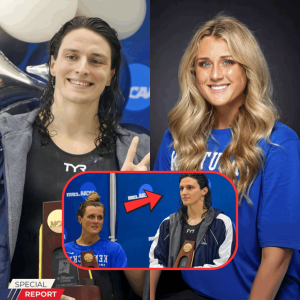In a sensational twist that captured headlines across the U.S. sports world, a viral social media storm claimed that transgender swimmer Lia Thomas had been stripped of every medal she had ever earned. The allegation ignited an avalanche of online debate, sparked political commentary, and left many asking—did it really happen?
The answer, according to official sources, is an emphatic no. But the controversy reveals much more than a simple case of misinformation. It exposes a deep national divide over gender identity in sports—and how easily a well-crafted lie can shape public perception.
The Viral Story That Shook the Internet
On Tuesday morning, as Congress held hearings over proposed changes to Title IX protections, a Facebook post exploded online, declaring:

“NCAA Re-evaluates Medal Distribution—Acknowledges Mistake and Will Transfer Medals from Lia Thomas to Riley Gaines.”
The headline didn’t come from a major outlet. It didn’t cite verifiable sources. It originated from SpaceXMania, a known satire website that regularly publishes fake news content under the guise of parody.
And yet, that didn’t stop the story from going viral.
Within hours, the post racked up thousands of reactions, shares, and outraged comments—many treating the claim as fact. News aggregators republished the piece without proper context, and some public figures even referenced it during interviews and on livestreams.
The speed at which it spread—and the number of people who believed it—reveals just how powerful confirmation bias can be when social issues like gender and fairness in sports collide.
What Actually Happened at the 2022 NCAA Championships
The real events surrounding Lia Thomas are a matter of public record. In 2022, Thomas, swimming for the University of Pennsylvania, became the first transgender woman to win an NCAA Division I title after taking first place in the 500-yard freestyle.
In the 200-yard freestyle, Thomas tied for fifth place with University of Kentucky swimmer Riley Gaines. Both athletes were awarded the same recognition. No medal reassignments occurred. No awards were stripped. According to the NCAA:
“The results of the race are final,” said NCAA spokesperson Greg Johnson in an official statement to the Associated Press.
Contrary to the claims in the viral article, the NCAA does not issue Olympic-style medals for these championships. Instead, they award trophies to top finishers—none of which have been rescinded or reallocated.
Satire Disguised as News
SpaceXMania, the source of the hoax, openly brands itself as a satire publication. It includes disclaimers on its homepage and individual articles. But in this case, the story was designed so convincingly—and shared so widely out of context—that many readers mistook it for a real report.
It’s not the first time satire has gone viral and been mistaken for truth. However, what makes this case unique is its timing: the post gained traction during an ongoing national debate about trans athletes, giving it a political and emotional charge that ensured maximum reach.
Riley Gaines and the Ongoing Title IX Debate
Riley Gaines, who has become an outspoken advocate against transgender participation in women’s sports, was among the four witnesses who testified at the House Oversight subcommittee hearing on Tuesday. The hearing focused on proposed updates to Title IX, including language that would protect students from discrimination based on gender identity.
While Gaines has consistently criticized the NCAA’s decision to allow Thomas to compete, she has not claimed that Thomas’s medals were taken away. The viral narrative, however, placed her at the center of an event that simply never happened.
Why the Public Was So Quick to Believe It
The fabricated story resonated because it confirmed the expectations of a large and vocal segment of the population. For many Americans, the idea of Lia Thomas losing her titles felt like poetic justice—a resolution to a controversy that has sharply divided the public for years.
It didn’t matter that the claim was false. It felt true enough.
This is what misinformation experts call “emotional accuracy”—when a story aligns so well with what someone already believes that its factual accuracy becomes secondary.
The Real Consequences of Fake News
While some may view viral satire as harmless, the Lia Thomas hoax had real-world implications. It hijacked the national conversation, drowned out facts, and gave opponents of LGBTQ+ rights a narrative they could weaponize, even if temporarily.
It also placed Lia Thomas back in the spotlight under false pretenses—forcing her name and legacy into a firestorm fueled not by new facts, but by manufactured outrage.
Even more troubling, the hoax undermined trust in legitimate journalism. As more people rely on social media for news, the line between fact and fiction continues to blur.
Final Word: The Results Are Still Final
Lia Thomas has not lost her titles. The NCAA has not revoked her trophies. No medals are being handed to Riley Gaines.
And yet, for millions who saw the headline without context, the damage is already done.
In a world where headlines are often consumed without reading the story, where emotion outpaces evidence, and where satire can spread like wildfire, the truth is increasingly fragile.
But it still matters.





